
Why Infrastructure May Be the Most Underrated Asset Class of 2025 (Ep. 82)
Podcast: Play in new window | Download | Embed
When electricity demand in the U.S. hit a record-breaking high on July 28th, 2025, it wasn’t a blip; it was a signal.
In this powerful follow-up to Episodes 69 and 78, Robert Curtiss welcomes back Michael Underhill, founder and CIO of Capital Innovations, to unpack the megatrends shaping the future of investing.
From surging AI-driven capital expenditures to the multi-trillion-dollar rebuild of America’s power grid, Michael outlines why infrastructure is no longer a “nice to have” but an essential portfolio diversifier. He explores how interest rate cycles, inflation, and the evolving definition of risk are impacting investor behavior and how private infrastructure may offer consistent returns, lower volatility, and true non-correlation in today’s concentrated markets.
What to expect:
- Why is electricity demand rising faster than forecasted?
- The three infrastructure megatrends to watch through 2050
- How to think like an institutional investor with alternatives
- The real reason private infrastructure may outperform in downturns
- And more!
Resources:
- Educational videos (bottom of the page)
- The Role of Infrastructure in a Diversified Investment Portfolio with Matthew Moreno and Jake Kelsall (Ep. 69)
- The Ongoing Demand for Infrastructure Investments (Ep. 78)
Connect with Robert Curtiss:
- rcurtiss@seia.com
- (626) 795-2944
- About Robert Curtiss
- LinkedIn: Robert Curtiss
- Facebook: Robert Curtiss
- SEIA
- LinkedIn: SEIA
Connect with Michael Underhill:
About Our Guest:
Michael Underhill is the Chief Investment Officer of Capital Innovations, a firm focused on infrastructure, energy, and ESG-aligned strategies. With decades of investment experience, Michael brings a deep understanding of macro trends and emerging opportunities in private and public markets. His team manages infrastructure-focused portfolios designed to align long-term capital with long-term value creation.